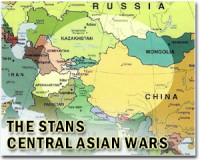| . |  |
. |
Mazar-I-Sharif, Afghanistan (AFP) April 9, 2011 Killings of UN staff in one of Afghanistan's safest cities have raised fears that plans for Afghans to take control of security from NATO troops in three months are being rushed. The northern city of Mazar-i-Sharif, famed for its opulent "Blue Mosque", was thrown into turmoil last week when demonstrators took to the streets after Friday prayers to protest over the burning of a Koran by an American pastor. The protests spiralled into the attack on the UN compound, which left seven foreign staff dead. Although peace has since been restored with stepped-up patrols and pleas from local leaders, some residents say the attack leaves them worried that Afghan forces are not ready to take control of security for the city. Those fears accompany a growing hostility to foreigners, often all lumped together as Americans in the minds of many uneducated Afghans. The United States led the 2001 invasion to oust the Taliban and Americans make up two-thirds of the 130,000 foreign troops in the country. A 25-year-old student who took part in last week's fateful demonstration but left before it turned violent said the attack on UN staff showed the security forces were "weak". "The time is definitely not right for a transition to our security forces in Mazar-i-Sharif," he said, speaking anonymously because of fears he could be detained by police if identified. "They are not ready, they are not well trained -- we saw what happened on Friday." Mazar-i-Sharif is one of seven areas of Afghanistan which will switch from international to Afghan security control from July, allowing limited foreign troop withdrawals ahead of the planned end of combat operations in 2014. Last month President Hamid Karzai announced that Afghan forces would take over in Mazar and several other areas in plans which should allow NATO-led forces, many of whom face domestic opposition to the war, to start withdrawing. The US commander of international troops in Afghanistan, General David Petraeus, visited the city after the attack and insisted Saturday that it should not raise concerns about the transition. "We've looked hard at that and that is not the case," he told reporters in Kabul. "Our sense is that individuals likely from outside the area... took advantage of the situation, hijacked it, an emotionally charged moment, and the result was terrible violence." Although NATO is in overall command of Mazar, where Germans make up the bulk of the mission, Afghan forces are on the front line. The city's police chief, General Ismatullah Alizai, admitted the UN attack showed their "weakness" and took the force by surprise. "The attack on the UN office was unexpected and police were not ready for that," he said. "But we have learnt our lesson and are now working hard day and night to prepare the security forces for transition. We will, God willing, be fully prepared by that time." Police officials say they have now detained three suspected masterminds of the attack, one of whom allegedly defected from the Taliban and had been living in a safe house. They also suggest the incident may have been connected to a feud between the provincial governor and powerful rivals seeking to undermine his authority. Whatever lay behind the tragedy, the protests have spread across Afghanistan leaving at least 24 dead. Experts say the Koran burning has fuelled discontent over 10 years of war, frustration that living standards are not improving more quickly and anger against foreigners over civilian casualties in international military operations. "They have burnt our holy book -- we don't want them in our country," said Hamidullah, a 25-year-old shopkeeper in Mazar who only uses one name. "We don't want the Taliban either, but at least they are Muslims, not infidels." Some residents worry about the extent to which the Taliban will return when NATO leaves, particularly in relatively peaceful parts of the country's north, west and centre -- and also believe the Islamists have whipped up a propaganda campaign over the Koran burning. Afghan officials admit they are holding talks with elements from the Taliban to end a war that has cost thousands of lives since 2001, but the prospect of a Taliban return horrifies Mohammad Zekerya, a 42-year-old teacher in Kabul. "I am deeply worried. We see that the Taliban are actually using this issue of burning the holy Koran to stir trouble and facilitate their return. "I predict street fighting, massacres and lots of bloodshed in the absence of the international forces. We have already proven that we cannot bring peace and stability on our own."
Share This Article With Planet Earth
Related Links News From Across The Stans
 US army apologizes for pictures of abuse in Afghanistan
US army apologizes for pictures of abuse in AfghanistanWashington (AFP) March 21, 2011 The US Army on Monday formally apologized "for the distress" caused by pictures portraying abuse allegedly committed by US troops serving in Afghanistan. "We apologize for the distress these photos cause," said a statement released by the Army. German weekly Der Spiegel earlier Monday published photos that it said showed two US soldiers in Afghanistan from a rogue army unit posing with d ... read more |
|
| The content herein, unless otherwise known to be public domain, are Copyright 1995-2010 - SpaceDaily. AFP and UPI Wire Stories are copyright Agence France-Presse and United Press International. ESA Portal Reports are copyright European Space Agency. All NASA sourced material is public domain. Additional copyrights may apply in whole or part to other bona fide parties. Advertising does not imply endorsement,agreement or approval of any opinions, statements or information provided by SpaceDaily on any Web page published or hosted by SpaceDaily. Privacy Statement |